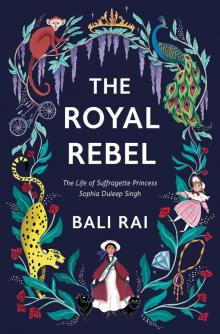Tales from India Read online
Page 2
The sadhu shook his head. ‘I know not,’ he replied. ‘And I care not …’
‘But …’
‘Ssh!’ the old man ordered. ‘Tell me this, oh splendid and wealthy man – to whom did these things belong before you?’
Akbar raised an eyebrow, and in that instant, his anger subsided and his curiosity grew. Who was this strange holy man with his questions? Akbar wondered if the man was a friend of Birbal’s. It would be just like his friend to test the emperor so. Regardless, Akbar was a thoughtful person, prone to philosophical debate and open to the thoughts and words of others. Perhaps he could reason with this man, and show Birbal that his was a truly inquisitive mind.
‘Did Birbal send you?’ he asked.
‘I know not this Birbal,’ the sadhu said. ‘And I care not. Answer my question. Who owned these things before you?’
‘Why,’ said Akbar, ‘my father, of course. You must have heard of the mighty Emperor Humayun?’
‘No,’ the sadhu replied. ‘I have not. But tell me, then, who was here before your father?’
Akbar shook his head.
‘That would be Emperor Babar – my grandfather …’ he replied.
‘And before him …?’
‘I … I …’ began Akbar.
‘Think a moment,’ said the sadhu. ‘This garden, these roses, the lake, the palaces – these things are only yours during your lifetime – correct?’
‘Well, yes, but …’
‘And when you are gone, they will belong to your son, and his son after him, and so on …?’
‘Yes, that’s true, but …’
‘Each person only owns these things for as long as they live on this earth, then?’
‘Yes.’
The sadhu smiled, showing blackened teeth. ‘We are but travellers in this world,’ he told Akbar. ‘We travel the road, and when we need shelter from the sun, we rest in the shade of a tree. But eventually we move on, friend. The tree, however, stays where it is, and shades the next traveller, and the next …’
Akbar found himself nodding. He had never considered such things, in such a way, before. He looked around at his beautiful, lush gardens, and at the magnificent building surrounding them. The old man was correct –Akbar was merely their latest owner, and he would not be the last.
‘Oh, wise one,’ he said. ‘I hear your words and I agree with them.’
‘Heed them carefully, then,’ the sadhu replied. ‘For each of us must die one day, and none will take these things with us. The world is not yours, or mine, friend. It belongs to us all …’
Akbar thought of his wealth, and the splendour in which he had spent his life, and he felt ashamed. His riches no more belonged to him than the water in a well, or the birds in the trees. To learn such a lesson, at the hands of this old man …
The sadhu stood wearily. ‘But,’ he said, ‘if you insist I go, then I shall leave at once …’
‘No, no!’ said Akbar. ‘Stay as long as you wish, and let us talk some more about the world.’
The sadhu smiled, and began to remove his turban. Then, spitting tree bark from his mouth, pulling away his fake beard and wiping his face clean, he turned to Akbar.
‘Perhaps it would be better to continue indoors, Your Majesty.’
‘Birbal – it’s you!’ Akbar exclaimed, and once again, he gave thanks that he had been blessed with such a wise and true ally.
‘Now, Your Majesty,’ said Birbal, ‘about my wife’s bangles …’
Akbar grinned sheepishly, shrugged and led his friend away.
A Tale of Two Challenges
As stories of Birbal’s wit and intelligence spread throughout Emperor Akbar’s kingdom, many challengers came forward. One, an arrogant and wealthy merchant named Raj Lal, believed Birbal to be a trickster who had duped Akbar. One day, whilst attending a court reception, Raj Lal took Birbal aside.
‘You and I both know what you are,’ he whispered to Birbal.
‘Oh?’ said Birbal. ‘And what am I?’
‘A charlatan,’ Raj Lal replied. ‘Whether it is magic or some other trickery, you have fooled Akbar. No one can be as clever as you …’
Birbal, always calm and assured, merely smiled. ‘Perhaps you might test me yourself?’ he suggested.
Raj Lal thought for a moment. ‘Yes!’ he said. ‘But I will set you a challenge away from the palace. You are too comfortable here. Maybe a new setting will show up your tricks.’
‘It does not matter where you set the challenge,’ said Birbal. ‘I am always happy to oblige.’
Raj Lal sneered. ‘Birbal,’ he said. ‘When you fail, your reputation will be ruined. I give you my word!’
Birbal said nothing.
Two days later, an invitation to lunch arrived from Raj Lal. Birbal dressed in his finest robes and made the short journey to the merchant’s house. Akbar, unaware of Raj Lal’s challenge, searched for his friend that afternoon.
‘Have you seen Birbal?’ he asked his personal guard.
‘He left this morning, Your Majesty,’ the guard replied. ‘He did not say where he was going.’
A short while later, Birbal’s fiercest court rival, Abdul Qadir, sought out the emperor.
‘A holy man has arrived,’ Abdul Qadir told Akbar. ‘He wishes to test the intelligence of your court.’
Akbar had grown bored without Birbal, and loved a challenge. He was also proud of his courtiers, all of whom he had hand-picked. His nine councillors were amongst the cleverest and most capable in the entire kingdom.
‘Bring him to me!’ he bellowed. ‘Let me meet this holy man!’
The bony holy man wore nothing but a cloth round his waist. He carried a mahogany staff and a pot that had been covered in cheesecloth. He placed the pot before Akbar and bowed.
‘Your Majesty,’ he said. ‘I am humbled in your presence.’
Akbar waved his hand, as though he was swatting a fly. ‘No need for pleasantries,’ he said. ‘You think you can outwit my court, do you?’
The holy man nodded. ‘I mean no disrespect,’ he said. ‘I am just a modest man. My challenge is a test of intelligence, nothing more. I have heard great things of your councillors. I am convinced, however, that my test will defeat them.’
Akbar grew intrigued. ‘What makes you think they will fail?’ he asked.
‘Because my challenge is unbeatable,’ the holy man replied. ‘I have travelled across Arabia and Persia, and into your lands, visiting every learned prince and king, and none have prevailed.’
Akbar smiled. ‘Well, today you will meet your match,’ he said. ‘What is your challenge?’
The holy man pointed to the clay pot. ‘I challenge your court to tell me what the pot contains,’ he said.
Akbar’s court fell silent.
‘Fair enough,’ said Akbar. ‘If you win, I will give you one thousand gold coins. But if you lose, you will tell everyone you meet that Akbar’s court is the wisest of all.’
‘Agreed,’ said the holy man.
One by one, Akbar’s councillors stepped forward. His astrologer consulted various charts and declared the pot to contain nothing but water.
‘Wrong,’ said the holy man.
His chief finance minister suggested gold.
‘Wrong,’ said the holy man.
Akbar’s prime minister came forward. ‘This is impossible,’ he said. ‘We cannot guess what is in the pot. This challenge is unwinnable. Have this wretch thrown in jail, Your Majesty!’
Akbar shook his head. He had accepted the challenge in good faith. His reputation would not survive if he grew angry and jailed the holy man.
‘Where is Birbal?’ he whispered to Abdul Qadir.
‘Who cares?’ replied Abdul Qadir. ‘We do not need him. I will win this challenge for you!’
But Abdul Qadir could not guess what the pot contained, despite many attempts. One by one, Akbar’s entire court failed, and soon only Akbar himself remained …
Birbal, meanwhile, sauntered slowly b
ack to court, having indulged in a sumptuous lunch. Raj Lal had provided roasted pheasant and curried goat, mountains of scented rice and spiced vegetables, followed by exotic and expensive fruits and nuts, and sticky sweetmeats. Raj Lal had been a very generous host. It was a shame that his arrogance had left him so embarrassed, however.
Raj Lal had set his challenge after lunch. Gesturing to Birbal, he cleared his throat so each of his numerous guests would hear.
‘Today I, Raj Lal, will set the famous Birbal a challenge,’ he announced. ‘And he will not succeed. After this, I will forever be known as the man who defeated Birbal’s legendary wit …’
The audience clapped and cheered wildly, all except for one man, who simply looked embarrassed. Birbal stood and asked Raj Lal to hurry up.
‘I must get back,’ he said. ‘Set your challenge.’
Raj Lal smirked. ‘Somewhere amongst this crowd is my only other guest,’ he said. ‘Your challenge is to pick him out.’
Birbal pretended to look confused. ‘But I thought they were all guests,’ he said.
‘Haha!’ said Raj Lal, beaming at his own genius. ‘I have you beaten already, dear Birbal!’
Once again, everyone in the room guffawed and hooted in delight. All bar the same man as before.
‘I don’t understand,’ said Birbal.
‘The rest are my servants!’ Raj Lal boasted. ‘They all work for me. Now tell me, supposed wise man, which is the only other guest?’
Birbal picked up a mango slice and swallowed it. The fruit was syrupy and utterly delicious.
‘Well …?’ asked Raj Lal, when Birbal failed to respond.
‘I really did expect a more difficult challenge,’ said Birbal, wiping mango juice from his chin.
He pointed to the only guest who hadn’t clapped and cheered. Raj Lal’s smile disappeared.
‘B-b-but …!’ he stammered, as the entire room fell silent.
‘He is the only one who didn’t cheer,’ Birbal explained. ‘So right away I knew that he was the guest. Your servants are paid to obey every command. He is not.’
Birbal grabbed a handful of pistachio nuts as the humiliated Raj Lal’s face went red.
‘Would you mind if I took these?’ he said. ‘I do like nuts …’
Akbar was almost ready to accept defeat when Birbal walked into court and belched.
‘Do excuse me, dear Majesty,’ he said. ‘I think I ate too much for lunch.’
‘Birbal!’ said Akbar. ‘This holy man has set a challenge that cannot be defeated. What can you do?’
Birbal shrugged. Next to Akbar, Abdul Qadir simmered with rage and prayed that Birbal would fail.
‘Explain,’ Birbal said to the holy man.
The holy man pointed at the clay pot.
‘I challenge you to tell me what is inside the pot,’ he said, before grinning.
Birbal took a pistachio from his pocket and began to peel away the shell. ‘Hmmm …’ he said. ‘I must tell you what the pot contains?’
‘Yes,’ said the holy man.
‘Just that, and nothing else?’
‘Yes …’
‘Very well, then,’ said Birbal.
He approached the pot and tore off the cheesecloth covering it.
‘Nothing,’ he declared. ‘Your pot contains nothing.’
‘But you cheated!’ the holy man yelled, as a wave of gasps encircled Akbar’s court. Abdul Qadir was the only one smiling. Birbal would pay for this.
‘Well?’ asked Akbar. ‘Why did you cheat?’
Birbal shrugged. ‘I did not cheat,’ he replied.
‘Of course you cheated!’ yelled Abdul Qadir. ‘You are lying to the mighty Akbar!’
Birbal sighed. ‘I did not lie,’ he replied. ‘I was asked to reveal what the pot contains. No one said that I couldn’t look inside …’
Akbar’s puzzlement turned to delight. Once again, Birbal had outwitted them all.
‘But, but …’ both Abdul Qadir and the holy man spluttered in unison.
‘Enough!’ Akbar declared. ‘Take your pot and leave, holy man! And do not forget to tell the world that Akbar’s court succeeded where all others failed!’
The holy man accepted defeat and left, as Abdul Qadir disappeared in a rage. Akbar turned to Birbal and grinned.
‘You continue to surprise and delight me, dear friend,’ he said.
‘Thank you,’ replied Birbal, taking more pistachios from his pocket. ‘Would you care for a nut …?’
Birbal Goes Missing
One summer evening, feeling out of sorts, Emperor Akbar quarrelled with his best friend and advisor, Birbal. Their simple, petty argument ended with Birbal storming from the palace. He vowed never to return. In the heat of the moment, Akbar reacted childishly too. ‘I don’t care!’ he yelled.
A hushed silence descended over Akbar’s court, and in the shadow of a stone pillar, Abdul Qadir, always envious of Birbal’s position, smirked at his opponent’s misfortune. ‘Good riddance!’ he whispered.
Within two days, however, Emperor Akbar regretted his words. He missed his best friend greatly, and wished he would return. The pleasures of court – vast banquets and wonderfully melodious music, dancers, jesters and performing animals – did nothing to assuage his sorrow. He had to find a way to regain Birbal’s friendship.
Akbar had nine advisors at court, of which Birbal was the most trusted. Now he turned to his others for help. Each man offered little, until it was Abdul Qadir’s turn to give advice. The last thing Abdul desired was Birbal’s return.
‘I took the liberty of searching for Birbal, Your Majesty,’ Abdul said. ‘I know that you and he are close, but I fear he has gone for good …’
‘No!’ Akbar cried. ‘It was just a squabble. Why would he leave?’
Abdul sensed his chance and took it. ‘Perhaps he isn’t the man you believe him to be?’ Abdul suggested. ‘Perhaps he does not value his position as greatly as he might?’
‘You dare to question my judgement?’ Akbar demanded to know. ‘I brought him to court …’
Abdul, red-faced and suddenly anxious, backtracked with speed. ‘No, no, Majesty!’ he insisted. ‘Not your judgement. I question the loyalty of Birbal …’
Akbar dismissed Abdul with a wave of his hand. ‘I will find him!’ he declared. ‘I will make this right.’
With five soldiers by his side, Akbar rode his horse to Birbal’s house, where he found the door locked. One of his men peered through a window.
‘It is empty, Your Majesty,’ the soldier said. ‘Not even a mouse stirs within.’
Akbar felt great sorrow rising inside his chest. ‘My dear Birbal,’ he whispered. ‘What have I done?’
When a week had gone by, and Birbal failed to appear, Akbar had a brainwave. ‘Abdul Qadir!’ he bellowed.
The snake-like courtier emerged from the shadows at once, his head bowed. ‘Yes, Your Majesty?’
‘Tell me, do you understand the maxim that it takes a thief to catch a thief?’
Abdul’s legs began to shake. Was the emperor accusing him of stealing …?
‘But, Your Majesty, I …’
‘Silence!’ Akbar replied. ‘I’m not accusing you of anything. I have an idea.’
‘An idea …?’ asked Abdul with barely concealed distaste.
He resembled a man chewing on an angry hornet. As far as Abdul was concerned, too many fancy ideas were discussed around court, all thanks to the outsider, Birbal.
‘I declare the following,’ said Akbar. ‘A thousand gold coins to any man who comes to the palace, satisfying certain conditions …’
‘Conditions …?’
‘Yes,’ Akbar told him. ‘The man must walk in the sun, without an umbrella, yet still be in the shade.’
‘But that is impossible,’ said Abdul.
‘For a man of your limited intellect, perhaps,’ Akbar replied. ‘Birbal might think otherwise, however. I certainly hope so.’
Abdul held his anger at bay, fearful of a dar
k prison cell. ‘Do you wish to see every wretch who will try to claim a reward personally?’
Akbar smiled. ‘No, no,’ he said. ‘After all, why do I pay my advisors? Disturb me only if Birbal comes back. And he will …’
Abdul smiled, as a plan formed in his mind. ‘Certainly, Your Majesty,’ he replied. ‘I shall take care of everything!’
‘Good fellow,’ said Akbar.
Many, many people journeyed to court, each to claim the reward. Women came with sari fabric wrapped round their faces, and men wearing half-formed turbans. Yet none of them met Akbar’s conditions. Abdul set up a side room, well away from the emperor’s eyes, and took personal charge of assessing every claim. He was inundated and grew increasingly angry as each day passed. Was there no end to greedy people, hungry for gold coins?
‘Enough!’ he cried on the seventh day. ‘I shall go and tell the emperor that his idea has not worked.’
‘But, sir,’ said one of Akbar’s guards. ‘There is a man in the courtyard.’
Abdul sighed. ‘Is he the last?’
‘For today,’ the guard replied.
‘Then send him in …’ Abdul wearily replied.
The man was wretched beyond imagination. Wearing only a cloth dhoti and caked in mud and Lord knows what else, he walked in holding aloft a traditional woven bed – a charpoy.
‘Failed,’ said Abdul without looking up.
The man set down his charpoy and challenged Abdul’s dismissal.
‘But, sir,’ he said. ‘I walked here in the sun, yet the strings of this charpoy gave me shade too. I have satisfied all of the emperor’s conditions. I deserve my reward.’
Abdul looked up then, and studied the wretch. Whoever the man was, he did not seem to be Birbal.
‘Nonsense!’ Abdul replied. ‘Now be gone before I have you thrown in jail!’
The man did not protest. Lifting his charpoy once again, he trudged out, stopping only to wink at the guard.
When Akbar learnt of his plan’s failure, he grew despondent. ‘Not a single person?’ he asked Abdul Qadir.
‘I’m sorry, Majesty,’ Abdul replied. ‘No one passed your test, and not one of them was Birbal. I fear he is gone for good …’
‘But we are friends,’ Akbar said.

 The Royal Rebel
The Royal Rebel Mohinder's War
Mohinder's War Starting Eleven
Starting Eleven Glory!
Glory! (Un)arranged Marriage
(Un)arranged Marriage Tales from India
Tales from India The Night Run
The Night Run Voices: Now or Never
Voices: Now or Never Rani and Sukh
Rani and Sukh Stars!
Stars! Web of Darkness
Web of Darkness The Crew
The Crew Fire City
Fire City The Last Taboo
The Last Taboo